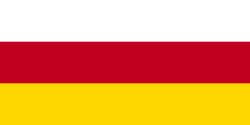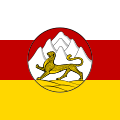| Proportion | 9:14 |
|---|---|
| Adopted | 1990 (South Ossetia), 1991 (North Ossetia) |
| Design | A tri-horizontal bar flag with the colors white, red, and yellow |
The Flag of Ossetia is a tricolor flag, top to bottom white, red, and yellow, used by the Ossetian people in Ossetia, a region spanning both sides of the Caucasus Mountains.
Contents
- History
- North Ossetia
- South Ossetia
- Design
- Symbolism
- Color scheme of the flag of North Ossetia
- Gallery
- See also
- Notes
- References
- External links
The flag is used by two distinct political entities: The Republic of North Ossetia–Alania (a federal subject of Russia), and the self-declared Republic of South Ossetia – State of Alania.
South Ossetia has been under the control of the Russian Federation since the 2008 Russo-Georgian war and is mostly unrecognized by the international community.
















